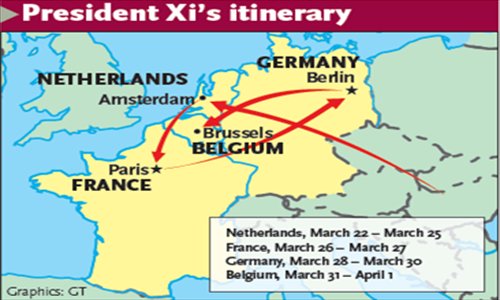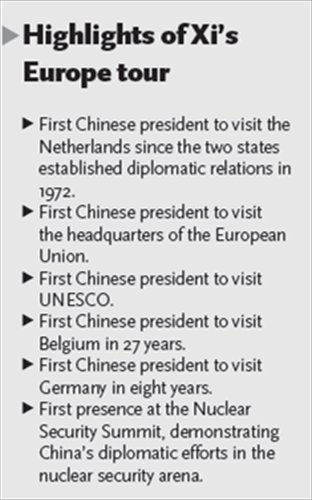Xi embarks on Europe tour

Graphics: GT

Highlights of Xi's Europe tour
China and the Netherlands on Sunday signed a series of documents on cooperation in energy, agriculture, trade and culture, as Chinese President Xi Jinping embarked on his first-ever European tour.
Analysts said that cooperation between China and Europe would be strengthened and continue to thrive, and it is unlikely to be affected by both sides taking different stances on the deepening Ukraine crisis.
In a joint statement issued by China and the Netherlands on Sunday, both countries decided to build a comprehensive partnership that stresses openness and pragmatism.
The joint statement came after a meeting between Xi and Dutch Prime Minister Mark Rutte, which said that both countries should pay more attention to the fundamental role of agriculture and water conservancy in bilateral cooperation, with priorities in the fields of dairy, breeding, flood control, training, food security and technological research and development.
Xi arrived in Amsterdam shortly after noon on Saturday, where he was welcomed by King Willem-Alexander and Queen Maxima at the start of a four-country tour.
Xi is accompanied by his wife Peng Liyuan, several ministers and some 200 top business delegates.
He is planning to meet US President Barack Obama on Monday on the sidelines of the Nuclear Security Summit in The Hague, where Obama is scheduled to address the escalating showdown with Russia over Crimea.
Russian President Putin's absorption of Crimea from Ukraine has drawn sanctions from members of the Group of Seven most-industrialized countries and challenged current US foreign policy.
"Xi's visit to Europe within the context that the Ukraine crisis deepens will contribute to the stability of China-EU relations, as he can remove barriers caused by the difference of views on the issue between the two sides, through reaffirming and elaborating on China's stance," Zhang Shengjun, an international politics professor with Beijing Normal University, told the Global Times.
He noted that some European countries are hesitant regarding sanctions on Russia and they are under pressure from the US, which may lead them to seek support from China and accepting China's suggestions.
Xi's four-country trip comes a week after China lodged an abstention on a Western-backed UN Security Council resolution condemning Crimea's referendum on joining Russia.
Shen Jiru, a research fellow with the Institute of World Economics and Politics at the Chinese Academy of Social Sciences, told the Global Times that the US wants to impose its political power but the ambition has exceeded its ability as both the US and the EU need to cooperate with Russia, hence sanctions are of limited scope.
"It provides an opportunity for China-EU cooperation as the world is becoming multi-polarized and powers are balanced with each other, with the prestige of the US being greatly challenged in this crisis," Zhang said, noting that as Russia may increasingly turn to China for help during sanctions, Europe may also want to balance relations with China.
Apart from Obama, Xi is to meet French President Francois Hollande and German Chancellor Angela Merkel on his trip, which ends in Belgium on April 1.
Experts said that the Ukraine crisis will not change the current pattern of China-EU relations as they are major trade partners, and both sides will continue strengthening bilateral economic cooperation.
Foreign minister Wang Yi said earlier this month that Europe has a position of priority on China's diplomatic agenda this year.
"The US may reconsider its strategy in Europe, but it's too early to say whether Sino-EU relations will be changed correspondingly," said Feng Zhongping, director of the Institute of European Studies at the China Institutes of Contemporary International Relations.
Zhang noted that as the US adopted its Asia pivot strategy, China should strengthen China-EU ties to help break some diplomatic deadlocks related to territory disputes with neighboring countries and better demonstrate its peaceful development on the diplomatic platform provided by Europe.
Agencies contributed to this story